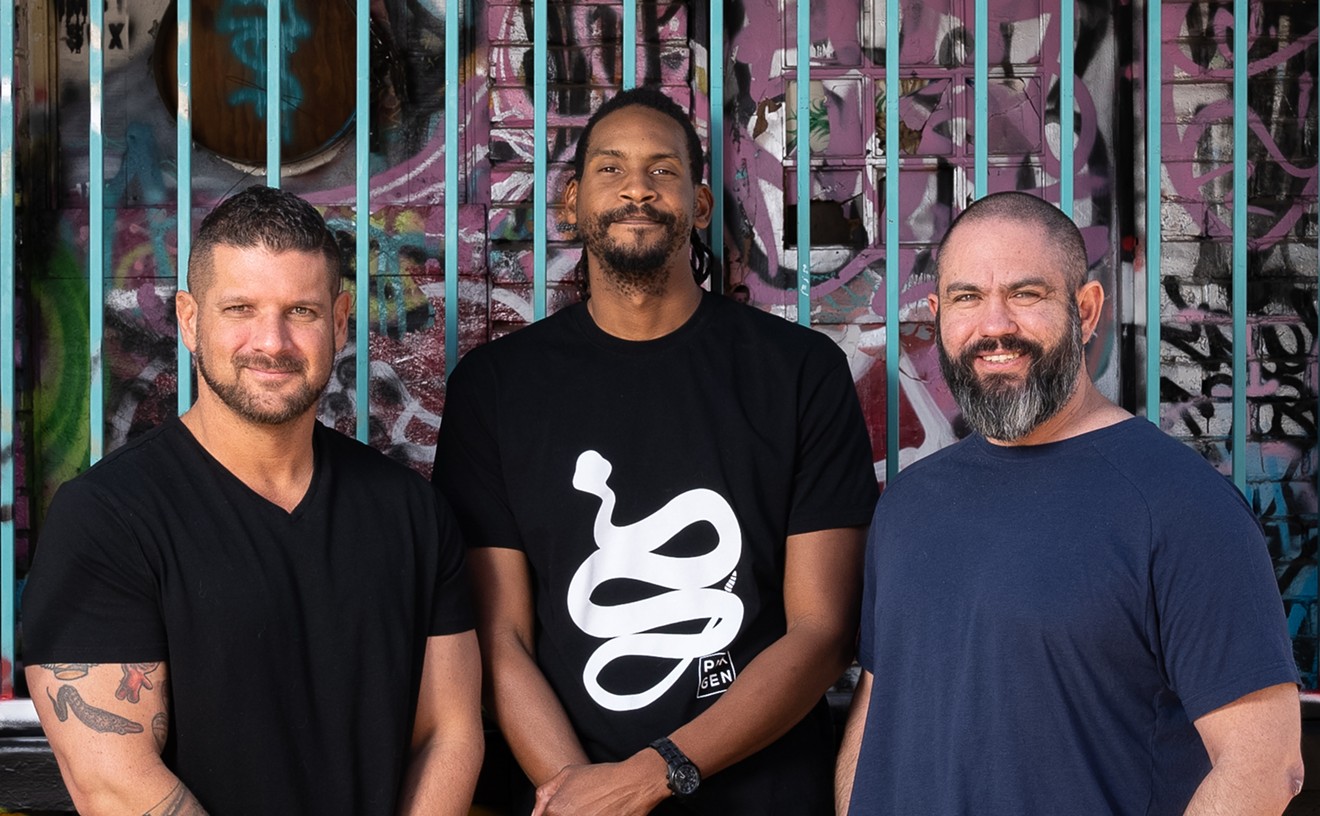Soul Food Scholar Adrian Miller on the Differences Between Soul and Southern Food and the History of Immigrant Cuisine
"Dropping Knowledge Like Hot Biscuits." That's author Adrian Miller's slogan — and it's not just funny, it's true. Known as the Soul Food Scholar, Miller is one of the nation's foremost authorities on soul food and in 2013, published the book Soul Food: The Surprising Story of an American Cuisine, One...
By Lauren Saria
October 21, 2015
[
{
"name": "Air - MediumRectangle - Inline Content - Mobile Display Size",
"component": "18478561",
"insertPoint": "2",
"requiredCountToDisplay": "2"
},{
"name": "Editor Picks",
"component": "16759093",
"insertPoint": "4",
"requiredCountToDisplay": "1"
},{
"name": "Inline Links",
"component": "17980324",
"insertPoint": "8th",
"startingPoint": 8,
"requiredCountToDisplay": "7",
"maxInsertions": 25
},{
"name": "Air - MediumRectangle - Combo - Inline Content",
"component": "16759092",
"insertPoint": "8th",
"startingPoint": 8,
"requiredCountToDisplay": "7",
"maxInsertions": 25
},{
"name": "Inline Links",
"component": "17980324",
"insertPoint": "8th",
"startingPoint": 12,
"requiredCountToDisplay": "11",
"maxInsertions": 24
},{
"name": "Air - Leaderboard Tower - Combo - Inline Content",
"component": "16759094",
"insertPoint": "8th",
"startingPoint": 12,
"requiredCountToDisplay": "11",
"maxInsertions": 24
}
]
"Dropping knowledge like hot biscuits."
That's author Adrian Miller's slogan — and it's not just funny; it's true. Known as the "Soul Food Scholar," Miller is one of the nation's foremost authorities on soul food. In 2013, he published the book Soul Food: The Surprising Story of an American Cuisine, One Plate at a Time, which won the 2014 James Beard Foundation Book Award for Reference and Scholarship. And when he's not traveling around the country eating at soul food restaurants and doing research for his next book, he also serves as a certified barbecue judge and as a Southern Foodways Alliance board member.
In just a few weeks, Miller will visit the Valley to speak at Arizona State University's 2nd Annual Food and Thought Speaker Series, but we got to chat with him before the event about the book, the history of soul food, and what exactly "soul food" means.
So the book came out a while ago. Is there anything new that you've learned since it came out?
You know, it's not the primary thing I'm working on right now because I'm working on my next book about African-American presidential chefs. So a lot of my energy is really on that. But I still get asked to speak and do things around the country, and I guess the thing that's really surprising to me is the extent to which soul food is just unknown to most people. Like, they've heard about it, but they just don't really know what it is.
Why do you think that is?
I think part of it just kinda goes back to what happened in the 1960s, and that even though this is a shared cuisine with white Southerners, there was a conscious effort to say, “Soul food is wholly black-owned.” I think by doing that, it kind of shut off people from exploring it, except maybe white hipsters and people who are generally more adventuresome. It kept a lot of people at bay, and so soul food hasn't really taken the route that other immigrant cuisines have taken.
Just to give you some examples, Mexican food, Chinese food, and Italian food are tremendous success stories, as far as immigrant cuisines go in this country. But 50 or 60 years ago, they were as obscure as soul food is [today]. But those cuisines were inviting to other people. At some point, people outside the ethnic group got comfortable not only eating the food, but also cooking it at home. And I think that explains why those three are successful. So, soul food didn't take that route for a lot of different reasons. Now that doesn’t mean that that can't change. But that's the reason why it played out that way. People think, “Oh, it's only African Americans that can cook and eat that food.”
Does that make sense?
Sure, and then the next question would be, what are some of the reasons that didn't happen for soul food?
I think part of it was that during the heyday of black identity and social consciousness in the '60s, you had black power advocates trying to figure out, “How do I connect a very disparate African-American community across the nation?” Because although people in the North and the West could identity with what was happening in the South at the time with the civil rights movement, they didn't have their own experiences with oppression. What was happening in the Northern slums was not the same as what was happening in the rural South. Again, recognizable, right? And you could relate, but it was different.
So, cultural norms were one way that people could connect. Things like food, music, dance, dress, wearing Afros. All these cultural expressions were a way to bind people together. So to put people together, they really emphasized the blackness of all these endeavors and that necessarily sent a message to other people like, “Oh, hey, you don't understand this. Maybe you can't even access it.”
So there was a reaction to that — maybe not so conscious — but shortly after and at about the same time, you have this move to create and define soul food. And know that the term and the cuisine had existed way before all of this happened in the '60s. So then you get a white reaction to this thing. You see a bunch of white, Southern, ethnic cookbooks starting to come out. You see a lot of hillbilly cookbooks. You know, white cooks and Southerners who were used to eating the same food over 200 years. So, the legacy of all this is that the African-American contributions to Southern cooking – which are tremendous – have been obscured. Today, when you say, “Hey, name a famous Southern cook,” white people are going to come to mind first. Paula Deen. Her sons. Trisha Yearwood. Katie Lee. You know, people like that. Now, when you say name a famous soul food cook, I think people will struggle. They may say the Neeleys, but if you look closely at the cooking, I wouldn't call what they cook – at least on TV – I wouldn't call that soul food.
You've talked in other interviews about the difference between soul food and Southern food and how they're subtle. But they're definitely different. So what would a typical soul food plate look like and how would it be different from a typical plate of Southern food?
So that's a very good question. I would say a typical plate of soul food would be, let's see, I'll just give you my New Year's meal. So for New Year's Day what we would have is we would have some chitlins, some mixed greens – we did mustard greens and turnips with some ham hocks – some candied yams, some black-eyed peas with ham hocks. Then we would have lemon ice pops probably for dessert. So now a Southerner would probably do almost the same thing except they wouldn't have chitlins. They would have maybe baked ham or chicken or something like that.
So subtle differences. But the hallmark of soul food is really the seasoning. So I find Southern food tends to be blander and not as intense. And soul food is going to feature more of the funkier cuts and variety of meats. So chitlins, which are pig intestines, is a variety of meat that some people don't eat because of what it is. Some people don't eat it because of the smell. And some people just don't eat it because they think it's low-class food. They think of it as tawdry food. And then are many African Americans who feel the same way about it, but there are also many who think differently about it. In restaurants mainly, you just don't see a lot of variety of meats showing up as entrées. They may be used to season the meats, you know, the ham hocks to season vegetables and other things. But you just don't see it as an entrée – whereas you would see that with soul food.
If there was one misconception you could dispel about soul food, what would be the most important one to you?
The first, the biggest one I want to say is that, this idea that soul food is inherently unhealthy. What I'm trying to do in my work and in my presentation is I'm trying to parse out what soul food is. What most people think of as soul food is really the celebration food of the rural South. And in this country, what we define as immigrant cuisine is usually the celebration foods of the old country, which over time, ceases to be the celebration food and becomes more of the core diet. And that's what soul food is. So you know, fried chicken, the glorious cakes and pies, all of those things. At one point in the history, that was once-in-a-while food. But as people moved out of the South, it transplanted in places and gets more prosperous. They remember the good-times food of the old country and they just start to eat it more often as a sign of their new, kind of, status. So, if you eat celebration food day in and day out that doesn't bode well for your health. But if you actually look at what African Americans were eating before the Civil War and after the Civil War in the rural South, it's very close to what we call a vegan diet. It was mainly seasonal vegetables, and meat was not the main part of the diet. Meat was just, basically, to season vegetables, which is a practice that was used in West Africa. And then the second point here is that if you look at what nutritionists are telling us to eat these days – dark leafy greens, sweet potatoes, fish – all of that is the building blocks of soul food. So it's really about how the food is prepared.
In your research, have you found places that are serving that type of healthier, everyday soul food?
Oh, yeah, actually that's the hottest trend in soul food. Vegan and vegetarian soul food is the hottest trend.
And what are your thoughts on new interpretations of soul food?
I'm actually okay with it because, I guess, my end game is I want soul food to be broadly accessible. And just to harken back to something I said earlier, it's just not going to happen unless people outside the culture not only support soul food restaurants but feel comfortable making dishes at home. And necessarily that means you're going to raise question of authenticity because any time something goes mainstream, it does change. In that sense, I expect soul food to become more like Southern food in that if it goes mainstream, those dishes will get milder and less spicy. But my hope is that there could be an embrace of soul food in all of its complexity.
Adrian Miller will speak at 2nd Annual Food and Thought Speaker Series on Thursday, November 5 from 5:30 to 9 p.m. at the Health North Building (550 N. 3rd St.) on ASU's Downtown Phoenix campus. Registration for the event costs $25 and can be purchased online.

KEEP NEW TIMES FREE...
Since we started New Times, it has been defined as the free, independent voice of Phoenix, and we'd like to keep it that way. Your membership allows us to continue offering readers access to our incisive coverage of local news, food, and culture with no paywalls.
You can support us by joining as a member for as little as $1.

Lauren Saria
Contact:
Lauren Saria


Newsletter Sign Up
Enter your name, zip code, and email
I agree to the Terms of Service and
Privacy Policy
Sign up for our newsletters
Get the latest
food & drink
news, free stuff and more!
Trending
Use of this website constitutes acceptance of our
terms of use,
our cookies policy, and our
privacy policy
The Phoenix New Times may earn a portion of sales from products & services purchased through links on our site from our affiliate partners.
©2024
Phoenix New Times, LLC. All rights reserved.
Do Not Sell or Share My Information
Do Not Sell or Share My Information






